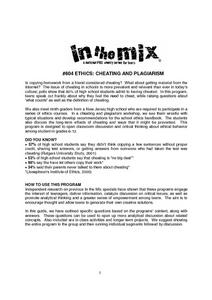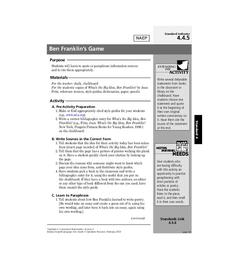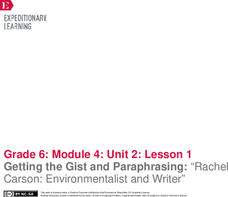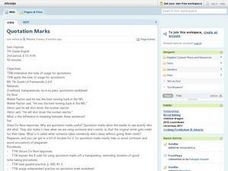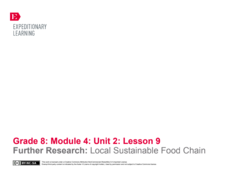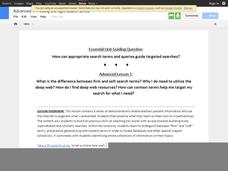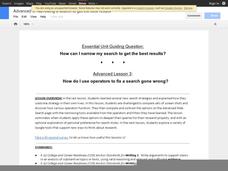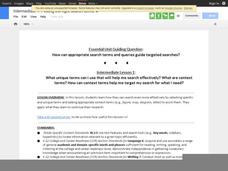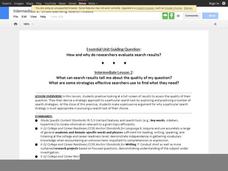Curated OER
Ethics: Cheating and Plagiarism
Students examine the reasons why students cheat and plagiarize material. They discuss what could have been done to avoid cheating and copying material. They answer questions to end the lesson.
EngageNY
Grade 9 ELA Module 3, Unit 3, Lesson 3
Plagiarism is the theft of intellectual property. To avoid this crime, class members learn how to create a works cited page and how to craft in-text citations. After examining a high-performance model paragraph and an example of a works...
Curated OER
A Time Period in American History
Researchers combine music, narration, photos, and text to form a presentation for their classmates about a time period in American History. Proper research and documentation techniques are emphasized. The lesson plan, created by Apple...
Curated OER
Ben Franklin's Game
A reading of What's The Big Idea, Ben Franklin? provides an opportunity for class members to practice paraphrasing, quoting, and citing sources. An exercise on how to avoid plagiarizing is also included.
EngageNY
Getting the Gist and Paraphrasing: “Rachel Carson: Environmentalist and Writer”
Don't copy me. Scholars prepare to dig in with an introduction to their research folder and a discussion about plagiarism. They then review the meanings of harmful and beneficial and how the words apply to the use of DDT. They finish the...
Curated OER
Language Arts: Quotation Marks Practice
After reviewing the eight rules for using quotation marks, class members complete worksheets as independent practice and review how these punctuation marks change the meaning of a sentence. Additional worksheets are provided for homework.
EngageNY
Further Research: Local Sustainable Food Chain
Researchers review how to create citations, find reliable sources, and paraphrase. Next, using guided task cards and their researcher's notebooks, they investigate the question they developed in instructional activity eight about the...
EngageNY
Deepening Your Research
Give credit where credit is deserved. Scholars discuss what makes a credible source as they take a look at "An Apparel Factory Defies Sweatshop Label, but Can It Thrive?" Learners read the article to look for answers to the research...
Curated OER
MLA Documentation
What information needs to be cited? Give your growing writers some clues into plagiarism and how to avoid it. If they know when to cite information, they'll be far less likely to plagiarize! Several examples are available here to study...
Curated OER
Paraphrasing-Timbuktu in Your Own Words
How do you paraphrase information? Part of plagiarizing is taking information word for word and using it in your writing. Teach your writers how to paragraphs correctly to avoid this! They watch a QuickTime video on Timbuktu and...
Curated OER
A Walk on the West Side
High schoolers comprehend what makes up the physical community. Read and construct scale drawings and models. Explore the history of infrastructures and how the contributions of science, math and industry have led to the development of...
Curated OER
Credible Sources on the Internet: What to Trust, What to Dismiss and When to Cite a Source
Wait, you mean researchers don't all use Wikipedia? Teach your class about intelligent research with a lesson about evaluating digital sources. The lesson starts with a quickwrite and includes vocabulary exercises and several...
Channel Islands Film
Once Upon a Time (Sa Hi Pa Ca): Lesson Plan 3
What was the most significant tool used by the Chumash? How did the environment make the tool possible? What group behaviors allowed the Chumash be be successful for thousands of years? After watching West of the West's documentary Once...
Curated OER
Springfield Wiki Lesson - Literature Circles
Using a variety of novels about survival, such as Julie of the Wolves by Jean Craighead George, pupils create author's studies using wikis. First, learners are placed in groups to study a particular novel. Then, they create a page...
9/11 Memorial & Museum
The Destruction and Rebuilding of the World Trade Center
How did an investigation into the causes of the collapse of the Twin Towers, as a result of the 9/11 attacks, inform the construction of the new 1 World Trade Center? That is the central question of a resource that asks class members...
Curated OER
Phineas Gage: “Medicine: Then and Now” Pre-Reading Activity
What did medicine look like a hundred years ago? Two hundred years ago? Invite small groups to conduct research on the history of a chosen medical advancement before reading Phineas Gage: A Gruesome but True Story About Brain Science....
Google
Advanced 2: Understanding Search Results
Effective researchers use a variety of techniques to find what they need online. Pupils who complete the activities listed here should already have an arsenal of strategies for searching. They will learn about and practice two new...
Google
Advanced 1: Picking the Right Search Terms
Many people, when searching online, will type in what they are looking for without much thought. But what's the next step, if they don't get the desired results? Careful selection of search terms. Your class can develop a sense for...
Google
Advanced 3: Narrowing a Search to Get the Best Results
Familiarize your class with Google operators, specific symbols, or words they can use to express more clearly to the search tool what they want to find. With the resources included here, they can test their previous knowledge, view...
Google
Advanced 4: Searching for Evidence for Research Tasks
Research was very different in the past. Pupils once had difficulty finding sufficient information, but now they have the opposite problem. Show your class how to pick the best resources out of the millions of sites an online search will...
Google
Advanced 5: Evaluating Credibility of Sources
How do discerning readers determine bias and credibility? Ask small groups to figure it out! First, each group is provided with either articles or videos that contain bias. They examine the resources, respond to included questions, and...
Google
Intermediate 1: Picking the Right Search Terms
A search can be strengthened by unique terms. With the activities and presentation included here, show your class how to target their searches with unique terms and context terms. They can then practice their search skills with...
Google
Beginner & Intermediate 5: Evaluating Credibility of Sources
Convey how to determine appropriate and credible online sources with a series of three lessons. After completing the lessons, class members will know what kinds of sources to use, how to identify credible sources, and how tone and style...
Google
Intermediate 2: Understanding Search Results
Teach your class some strategies for effective searching. Pupils should assess the whole results screen and then determine how to go forward with their searches. A table of strategies is included, as is a challenge. After they complete...


